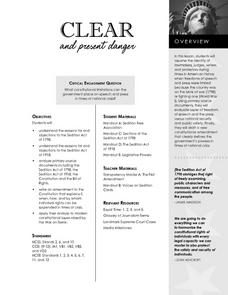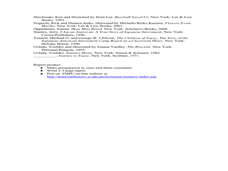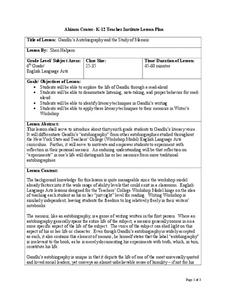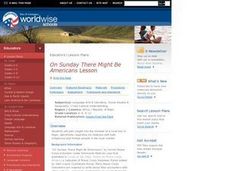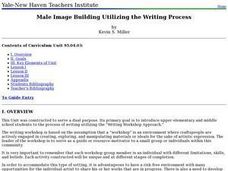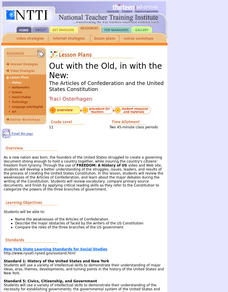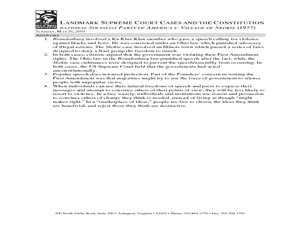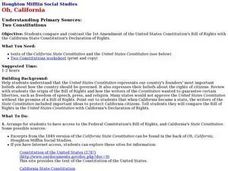Curated OER
Clear and Present Danger
Students assume identities of lawmakers, judges, writers, and protestors during times in American history when freedoms of speech and press were limited because country was on the brink of war or fighting one. Students use primary source...
Robert F. Kennedy Center for Justice and Human Rights
Vaclav Havel: Free Expression
Develop an understanding of universal human rights, particularly the freedom of expression, with the questions and activities that analyze the conflicts of Vaclav Havel. Learners define, interpret and rephrase the human rights article in...
Curated OER
"I Believe..." Podcast Style
Use this communication skills lesson to emphasize evaluating a speaker's main point and argument. After reading Martin Luther King's, "I Have a Dream Speech" and John F. Kennedy's speech, "I Believe in an America Where the Separation of...
Curated OER
Writing Newspaper Articles
Pupils write newspaper articles regarding their service learning experiences. In this writing skills lesson, students review the writing process skills to develop high-quality articles. Pupils write articles regarding the their acts of...
Curated OER
Women Writers and Dissent in 20th and 21st Century American Literature
Tenth graders read examples of writings by women authors showing their dissent. After completion of their reading, they brainstorm on why they believe female authors have criticized society. In groups, they use the Internet to research...
PBS
Gloria Steinem’s Ancestry and Women’s Rights Movements: Lesson Plan | Finding Your Roots
Introduce class members to Presidential Medal of Freedom winner, activist, writer, and lecturer Gloria Steinem with a PBS resource that not only investigates Steinem's ancestry but also encourages learners to trace their own.
Curated OER
Lesson III: Crisis, Pearl Harbor, Internment
The third in a series of lessons introduced by “A Fence Away From Freedom,” uses the Smithsonian website, “A More Perfect Union: Japanese Americans and the U.S. Constitution” and focuses on the section of the presentation devoted to the...
Roy Rosenzweig Center for History and New Media
Slaves and Indentured Servants
In theory, at least, indentured servitude and slavery were two different practices in the American colonies. Class groups conduct a close reading of two primary source documents, one written by a slave and one by an indentured servant,...
Curated OER
Gandhi's Autobiography and the Study of Memoir
Seventh graders explore the life of Gandhi using his autobiography and memoir. In this Gandhi exploration lesson, 7th graders analyze Gandhi's literary voice by reading his autobiography. Students identify literary techniques in Gandhi's...
Curated OER
Sojourner Truth
Students describe contributions made by Sojourner Truth and identify freedoms they enjoy because of the efforts of people like her. They define suffrage and abolition by experiencing it and by hearing an explanation of the definition.
Curated OER
Leaders in Journalism
Students examine the changing leadership roles and qualities of writers, journalists and editors in public life. They view short video clips by prominent journalists and read about various journalists in history.
Curated OER
Abraham Lincoln and Frederick Douglass: A Compare and Contrast Lesson Plan
Two great men, one time period, and one purpose; it sounds like a movie trailer, but it's not. It's a very good comparative analysis lesson plan focused on Abraham Lincoln and Frederick Douglass. Learners will research and read...
Indiana University
World Literature: "One Evening in the Rainy Season" Shi Zhecun
Did you know that modern Chinese literature “grew from the psychoanalytical theory of Sigmund Freud”? Designed for a world literature class, seniors are introduced to “One Evening in the Rainy Season,” Shi Zhecun’s stream of...
Curated OER
Slave Narratives: Constructing U.S. History Through Analyzing Primary Sources
Learners access oral histories that contain slave narratives from the Library of Congress. They describe the lives of former slaves, sample varied individual experiences and make generalizations about their research in journal entries.
Curated OER
On Sunday There Might Be Americans Lesson
Young scholars examine the life of a rural Niger boy. They discover his relationship with foreigners and indigenous peoples. They read excerpts from a former Peace Corps volunteer.
Curated OER
Male Image Building Utilizing the Writing Process
Introduce your class to the techniques of proper writing. In groups, they brainstorm their ideas on family structures and discuss the importance of having a male figure in their lives. After listening to an African-American poem, they...
Curated OER
Out with the Old, in with the New
Eleventh graders review the weaknesses of the Articles of Confederation, and explore the major debates during the writing of the Constitution. They review vocabulary and compare primary source documents to study the three branches of...
PBS
The March on Washington and Its Impact
High schoolers read Martin Luther King, Jr's speech that he gave in Washington. They identify the social conditions that led to the civil rights movement. They discuss the significance of the March on Washington.
Curated OER
North and South - Impact of the Abolitionist Movement
Students examine history of slavery in United States, discuss abolitionists such as Frederick Douglass who worked to end slavery, listen to excerpts from Douglass' autobiography, and visit interactive Underground Railroad web site.
Curated OER
On Sunday There Might Be Americans Lesson
Students gain insight into the mindset of a rural boy in Niger, specifically regarding his relations with both indigenous and foreign people in the local market. They probe the deeper meanings of the story and relate important ideas...
Curated OER
Making Connections: I Know Why Caged Birds Sing
Young scholars discuss equality and fairness by reading a Maya Angelo poem. In this U.S. history lesson, students read the poem I Know Why Caged Birds Sing, and discuss how the era it was written in affected the words. Young scholars...
Curated OER
Landmark Supreme Court Cases and the Constitution: National Socialist Party of America v. Village of Skokie (1977)
Learners examine the impact of court decisions. In this Supreme Court lesson, students read the National Socialist Party of America v. Village of Skokie (1977) case study regarding First Amendment Rights. Learners take notes on the case...
Curated OER
Two Constitutions
Fourth graders participate in a teacher-lead discussion about the United States Constitution and the California State Constitution. They compare the Bill of Rights in the United States Constitution with Califonia's Declaration of...
Curated OER
JUSTICE
Students analyze the role that Alabama played in three major events of American History and how those roles contributed to Alabama being dubbed the "Cradle of the Confederacy" and the "Birthplace of the Modern Civil Rights Movement."
Other popular searches
- Freedom Writers Movie
- Freedom Writers Diary
- Freedom Writers Lesson Plans
- Freedom Writers the Movie
- Freedom Writers Movie Quiz
- Freedom Writers Movie Guide
- Freedom Writers Diary Movie
- Freedom Writers Film
- Freedom Writers Erin Gruel
- Freedom Writers Movie Plans
- The Freedom Writers Diary
- Freedom Writers Movie Lesson


